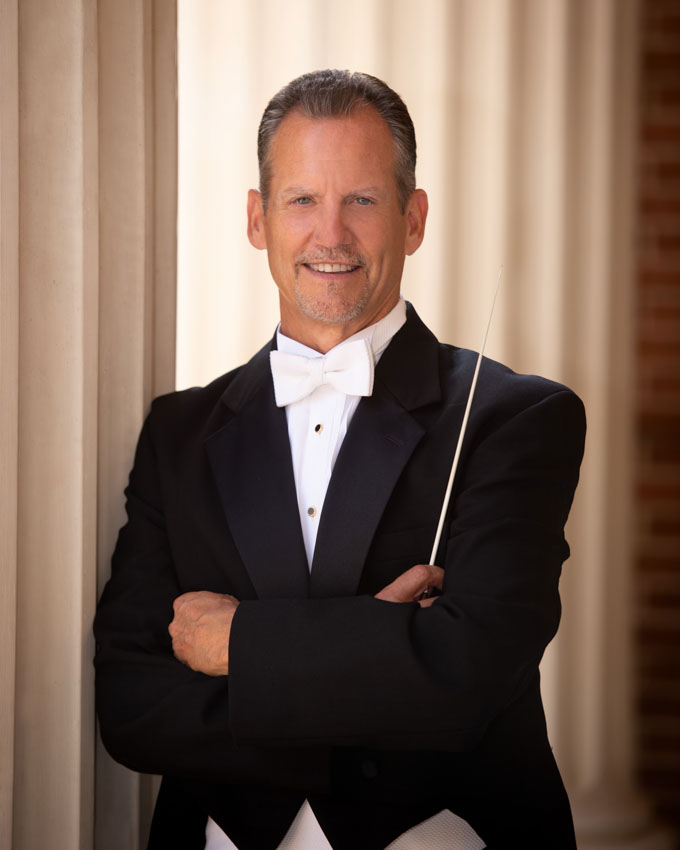USM Symphony to Perform Epic Concert in Longtime Director’s Finale
Tue, 04/09/2024 - 12:10pm | By: Mike Lopinto

When The University of Southern Mississippi (USM) Symphony Orchestra performs its season finale on April 27 at 7:30 p.m. in Bennett Auditorium, the occasion will not only mark the final stop of a tremendous season of musical voyages, but also mark the final concert for music director, Dr. Michael Miles, who has announced his retirement.
Fittingly, the program includes a piece that is inspirational for him and aspirational for any orchestral musician – Gustav Mahler’s Symphony No. 1 in D Major. Tickets for this extraordinary evening of music are available at usm.edu/symphony.
“I chose this work because it represents closing the full circle of my career,” noted Miles. “Even though I played in band and sang in choir, I began college as an engineering major. I was very sheltered in my exposure to the great music that existed in the classical canon until a friend invited me to listen to Mahler’s Symphony No. 1.”
Added Miles, “It moved me in a way that nothing else had to that point in my life. I had no idea that music could contain such power, such passion, and so many different emotions all at the same time. That night changed my life, and the next day I changed my major to music.”
Miles selected the piece that triggered his incredible musical voyage 47 years ago. For him, Symphony No. 1 was the only piece he considered worthy for a final concert. Miles also chose this piece because it represents a significant challenge to the students.
“I told them that every one of them would grow as a musician through the process of learning this music, and I know the audience will be impressed at how they have risen to the occasion,” said Miles.
Miles also programmed another piece on the program because of its significance to voice professor, Dr. Taylor Hightower. Mahler’s “Songs of the Wayfarer” was a singular piece of music that spoke deeply to him , so much so that he felt his career would not be whole without being able to perform it. Since the musical themes are very much related, Miles tendered the invitation so that Mahler’s genius will be on full display.
This massive work with extended winds, including four flutes and piccolos, four oboes and English horn, four clarinets, Eb and bass, three bassoons and contrabassoon, seven horns, five trumpets, and four trombones besides a large compliment of percussion, strings and harp. It is quite rare to see this many forces onstage at once, yet this speaks to the extensive and prodigious fortune of Hattiesburg to have this concert completely performed by students of the Southern Miss School of Music.
Imparting wisdom and providing life-altering experiences to young people has been Miles’ life-long passion. His career has always been about the students. He credits the thousands of student relationships he has enjoyed for more than 30 years for getting him out of bed every day. While he is grateful to everyone who supports the Symphony Orchestra, Miles is keenly aware of how important that support is to the students.
“There is nothing more rewarding to our students than to walk onto the stage and see an audience full of people they know are there to support their hard work and dreams,” Miles noted. “It fills the hall with energy and excitement that our students respond to with focus and passion.”
One of the dominant forces in the symphonic genre, Mahler’s first contribution took an unusually long time to reach its final form. Possibly begun in 1884, his first two symphonies seem to have been modified greatly over several years and performances.
However, most of it was composed during the time and under the influence of his troubling involvement with a married woman who was the wife of a German soldier, Captain Carl von Weber, the grandson of the composer of the popular opera “Der Freischütz,” Carl Maria von Weber. Mahler and Marion planned to run away together, but Mahler did not show up at the rendezvous. He poured the emotional energies into composing this symphony.
Mahler described the symphony’s finale as “the cry of a wounded heart.” It grandly struggles to move from tragedy to triumph. Mahler even requests that all the horns, playing the “chorale resounding over everything,” stand up so that the melody may make its proper effect and, if possible, drown out everything else with the song of joyous triumph.
Similarly, the Symphony ends its season on a triumphant note, and Miles concludes a lifelong dream at the close of his academic career.
“It’s been a wonderful year of music-making with our Orchestra, and I will be sad to see it come to an end,” said Miles. “I am looking forward to time with my children, grandchildren, and golf.”
Purchase tickets for the event.